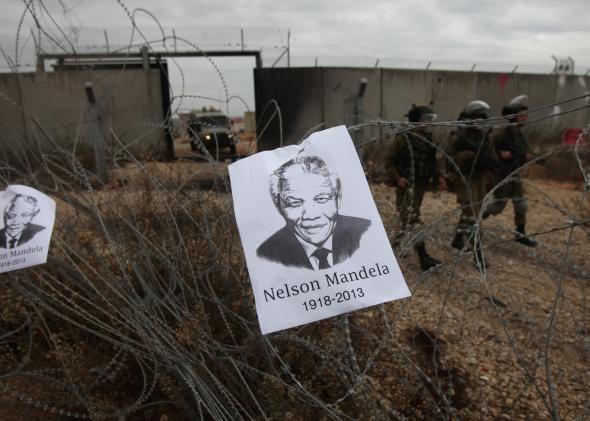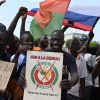By David Weigel
Every major news event, no matter how sad or epochal, is transformed by the power of social media into a way to carp about politics. Some among us want people to stop doing that.
With respect, let’s just ignore all of that well-meant advice. Nelson Mandela was a political activist. He ran in the first election he was allowed to run in—and won, obviously. When politics failed him, he joined the African National Congress, which engaged in infrastructure terrorism against an oppressive state. Just this one time I’ve got to agree with Bill Ayers: Mandela was not some safe, muppety “civil rights activist.”
He was a “loving revolutionary” and “officially a ‘terrorist’ according to the U.S. government until long after” he’d been freed and was touring the world as a hero. Actually, better to say I agree with Max Boot about this. The point: We should keep Mandela in context, as a freedom fighter. (It’s quite annoying that posters for the upcoming Mandela biopic, starring Idris Elba, refer to him as a “TROUBLEMAKER,” like he dropped fireworks in P.W. Botha’s bidet or something.*)
No, I think there are two political lessons you can take from Mandela straightaway. One: The U.S. sometimes identifies the wrong guy as the black hat. In 1990, when Mandela was finally being released from prison, Cox News Service broke the news that, err, the CIA helped put him there.
The intelligence service, using an agent inside the African National Congress, provided South African security officials with precise information about Mr. Mandela’s activities that enabled the police to arrest him, said the account by the Cox News Service.
The report, scheduled for publication on Sunday, quoted an unidentified retired official who said that a senior C.I.A. officer told him shortly after Mr. Mandela’s arrest: ”We have turned Mandela over to the South African Security branch. We gave them every detail, what he would be wearing, the time of day, just where he would be.”
At that time—we’re talking decades—the United States propped up quite a few horrendous regimes that were anti-Communist. Our intelligence helped leak the names, and thereby condemn, the Communist resistence to the Iranian mullahs. From 1965 to 1990, the years Mandela was in prison, the U.S. also poured money into the treasury of Mobutu Sese Seko, who did a fine job turning what we now call the Democratic Republic of the Congo into a failed state. But hey, he was anti-Communist! This stuff is so easy to condemn in retrospect. Mandela reminded us to catch it in real time.
The second lesson follows naturally from that: It’s really worth listening to what rebels say they want. Sometimes, sure, they’re going to lie or pivot toward tyranny. (Look at South Africa’s neighbor to the north and the tragedy of Robert Mugabe.) Sometimes they defy demonization. You don’t hear many of the (minority of) Republicans who voted against sanctions on South Africa reminiscing about it, but at the time they weighed anti-Communism against racial oppression and anti-Communism won out. In 1986, as Sam Kleiner remembered recently, Ronald Reagan asked Pat Buchanan to spice up a draft of a foreign policy speech to reinforce his line against Mandela’s African National Congress.
Night after night, week after week, television has brought us reports of violence by South African Security Forces, bringing injury and death to peaceful demonstrators and innocent bystanders. More recently, we read of violent attacks by blacks against blacks. Then there is the calculated terror by elements of the African National Congress – the mining of roads, the bombings of public places, designed to bring about further repression, the imposition of martial law, and eventually creating the conditions for racial war.
Read now, that’s some remarkable on-the-one-hand-ism. Sure, the apartheid state was heavy-handed; but the African revolutionaries were doing just as much to bring about the race war!
They weren’t. A lot of that has to do with Mandela, who, freed from prison, did exactly what he’d promised and completely opposed any black retribution for apartheid. But Mandela surprised so many people that there grew up a new theory: Mandela was the only reason the ANC, or South African blacks, wasn’t all-in for retribution. In 2004, WorldNetDaily informed readers of a rumor that the death of Mandela (a spry 86 years old at that point) would finally inaugurate the race war.
One of the operations planned entails 70,000 armed black men “being transported to the Johannesburg city center within an hour” in taxicabs to attack whites.
The plans are variously dubbed “Operation Vula,” “Night of the Long Knives,” “Operation White Clean-up,” “Operation Iron Eagle” and “Red October campaign.”
Operation “Our Rainy Day” was to be carried out after the death of Nelson Mandela and would have entailed blacks being transported to the largest cities in taxis.
The assailants were expected to “take over” fuel points and massacre whites. The attacks would lead to a coup.
Sources say most blacks in the country are aware of the plans. When racial disputes occur, blacks often tell whites, “Wait until Mandela dies.”
It’s been more than an hour, but, hey—no reports of armed blacks taking out whitey in Johannesburg. It’s a bigger bust than those “George Zimmerman verdict riots” we were promised this year. But that’s the kind of cracked thinking you fall into when you take someone out of politics and make him a saint, someone totally sui generis, impossible to keep in context. How about keeping the context? We can learn plenty from what Mandela got right and we only got right much, much later.
UPDATE: “Operation Vula” has yet to meet expectations, but this Daily Mail dispatch on the “looming threat of a race war” in South Africa is zipping around social media. The lede tells us of a white farmer murdered this week, and of how “Afrikaner protest groups claim that more than 4,000 have been killed since Mandela came to power.” If you’re a fan of textured, unsensationalized writing on the struggles of white South African farmers, read Eve Fairbanks. If not, read this story, I guess.
The real problem with the dispatch comes when we’re told about Julius Malema:
A bogeyman to white South Africans, Malema is popular among young blacks, and has also been an enthusiastic singer of Kill The Boer and another song called Bring Me My Machine-Gun.
Polls this week showed a huge surge in support among young black South Africans for his policies, which he says will ignore reconciliation, and fight for social justice in an ‘onslaught against [the] white male monopoly’.
Well, “Bring Me My Machine Gun” was a song sung by members of Spear of the Nation, the militant wing of the ANC. President Jacob Zuma has been known to belt it out, knowing that he courts controversy; he has not gone on to pillage whites in his four years in power. More importantly, the claim of the surging poll numbers for Malema doesn’t have a link. Can’t we find a poll gauging Malema’s support?
Opinion polls suggest that the ANC’s vote could decline by as much as ten per cent. The party will win 56.2 per cent of the votes, down from 65.9% in 2009, Nomura South Africa predicted in August. They suggest the DA share of the poll will rise from 16.7 per cent to 27 per cent percent and predicts a 6 per cent share for Agang and 4 per cent for Malema’s Economic Freedom Fighters.
The DA is the Democratic Alliance, the official opposition party, a centrist coalition that won 10 percent of the vote in its first election (1999) and won control of the Western Cape in 2009. Agang is a protest party, basically center-left. So the crazy anti-white politician the Daily Mail’s warning us about commands less than one-fourteenth the support of the ANC and one-sixth the support of the centrists. That’s the sort of information you might want in an informative article about the post-Mandela state of South African politics, isn’t it? Unless you’re just trying to scare people.
*Nancy Scola reminds me that Mandela’s given name, Rolihlahla, meant “Troublemaker,” so, ah, I get the poster now. It still looks sort of soft.















